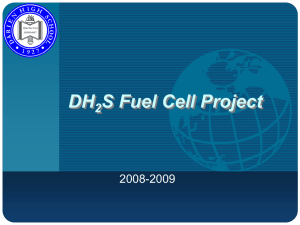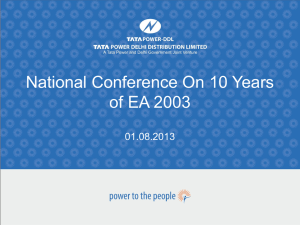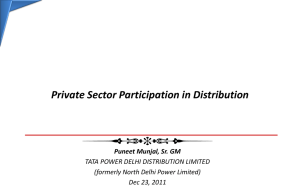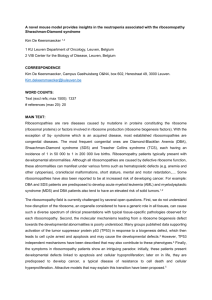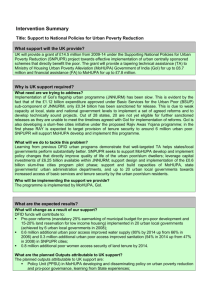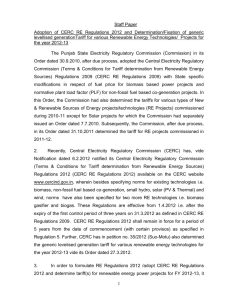ÅF Powerpoint template
advertisement
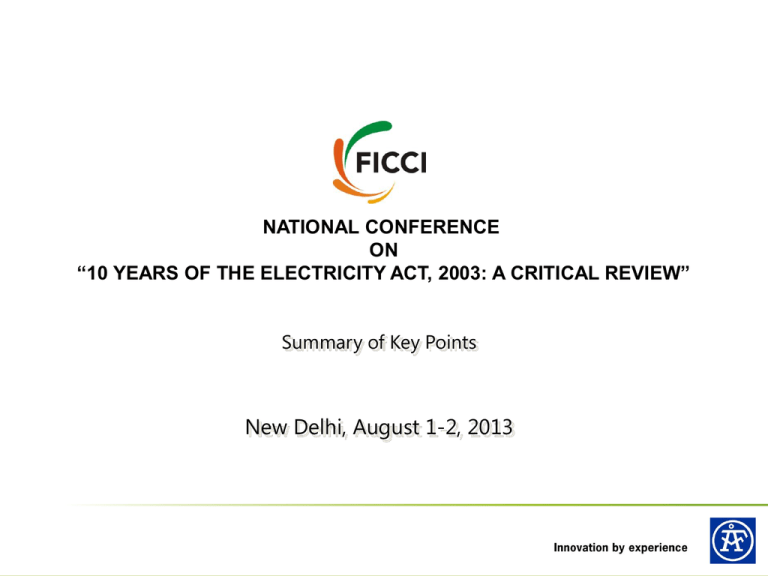
NATIONAL CONFERENCE ON “10 YEARS OF THE ELECTRICITY ACT, 2003: A CRITICAL REVIEW” Summary of Key Points New Delhi, August 1-2, 2013 Aspects Discussed 10 Years On – What have we achieved? Does the law need changes? Developments in the sector: Generation Fuel Transmission Distribution Rural Supply Power Markets, Competition and SBDs Retail supply: Separation of Carriage and Content Regulation Consumer participation 2 10 Years - What Have We Achieved? Very substantial progress in generation Unprecedented capacity Driven by the private sector A vibrant market Progress on transmission Limited private participation Significant bottlenecks emerging Continuing concerns in distribution Supply conditions are bad Rural supply - worse Finances remain un-mended – the biggest concern of all 3 Does the Law need changes? Some changes required, but this is not the biggest challenge Implementation of the law is the biggest challenge Mandate of law can only go so far There must be commitment to implement the law Carrot and stick necessary Central Government must lead the way “Consult, Consult, Consult” till they give in…. 4 Generation Current baseload driven mix is inappropriate and expensive. Consumer interests compromised Peaking power procurement a must. Should feature in law, policy and SBD Capacity statements must be mandated in law. Consumers must not be cut off if power is available. Discoms must be penalized for transgressions 5 Transmission STU has the planning functions at the state level. Observed in default today. Must collect data and report to CEA For RE, can become a registry for RPO (or hydro or any other portfolio obligations) Planning criteria must be announced and adhered to Open Access must be made nondiscriminatory. Further steps to remove conflict of interest may be required 6 Fuel Principle of fuel pass through essential Current issues on fuel must be resolved. If required a standing Committee chaired by the Prime Minister 7 Power Markets Open Access remains severely limited as compared to potential. Tariff and non-tariff barriers. Also operational hurdles (SLDC not prepared) Application of Section 11 Widespread misconceptions on the impact of Open Access. Open Access on the margin can help and not hurt the utilities Develop AS markets, capacity markets, futures, etc. Utilities need to plan their purchases and market participation much better. The poor performers are also the poor planners 8 SBDs SBDs have created a level playing field and fostered transparency Changes in the context of fuel situation that prevails due to deficit in gas and coal New SBD – Makes more changes than necessary Reduces developer to contractor Unduly high events of termination Past low tariffs may become history Unduly intrusive and prescriptive (e.g., lock in, fuel stacking, fuel stocks) Open Capacity – will be loaded into capacity charges Some risks just cannot be priced (e.g. GCV billing) 9 Distribution Even the best performing utility is not investment grade. Distribution needs urgent and prioritized actions Quarterly financial reporting is possible and must be mandated Audit of performance, including supply levels essential Technology (including smart grids) must be used Reform cannot be equated to tariff increases GoI must play the lead 10 Rural Supply HH electrification has lagged village electrification BPL rate of electrification alarmingly more than APL Access is not adequate. Supply is a must. No one monitors hours of supply. Load shedding protocol should be adopted as in Maharashtra More innovative approaches required in the rural areas. Provisions of the Act not utilized imaginatively 11 Distribution Privatization Agenda Privatization a failure, in-spite of successes of Delhi Franchising must achieve scale Baseline data is questionable. Must be validated Law must be amended to provide franchising with greater status and rights 12 Retail Supply: Separation of Carriage and Content Can overcome the challenges to privatization. Incumbent Discoms can continue as network provider Not a matter of choice of supplier alone. Will drive efficiency Some implementation aspects to be addressed. However these are manageable Issue is of legal mandate and political will 13 Regulation, Ombudsman and CGRF Severe delays in appointments Staff adequately and build institutional capacity Monitor the performance. Find acceptable means of doing so Gaps and protracted delays in regulatory appointments Prohibit appoints from bureaucracy and regulated entities without cooling off periods 14 Consumer Protection Make 94 (3) mandatory wherein the consumer representatives necessarily participate Fund the participation of consumer representatives (as Delhi is doing) Include quality of supply parameters in Electricity Bill (amend law if necessary) 15 Action Plan for Short, Medium and Long Term Rationalization of subsidies and alternate model for subsidy payment should be considered Strengthening of Governance Regulatory Independence: Proactive role in implementing change in provisions relating to Open Access, MYT and SOPs Assessment accountability of regulatory performance and ensuring No load shedding, particularly when supply is available Loss Reduction and Efficiency improvement measures to be strengthened. Tariff increases do not equate to reforms Utility Reforms DSM and energy efficiency at customer end to be encouraged Tariff Revisions to be regular and should not mask inefficiencies Consumer participation and protection of consumer interests Rating of Discoms, quarterly financial statements Open Access: Measures to rationalize charges and cross subsidy, augmentation of infrastructure, creation of awareness Market Reforms Preventing misuse of legal safeguards such as Sec 11 Competition in Retail Supply will require legislative changes Creating deeper competitive markets Independence and neutrality of system operator 16 Action Plan for Short, Medium and Long Term (contd…) Customer Service Orientation Efficient Power Procurement Practices and inventory planning Strengthening System & Processes Smart Grids, IT & C contributing to better generation, management and control systems network data Monitoring & Evaluation: Regular audits by third party agencies and reviews Reporting quality parameters in Consumer Bills Building Human Capital Expanse and complexity of the sector requires deep skills on a large scale, perhaps like no other sector System Operators need training and systems Development large scale consumer awareness is also a requisite for holistic sector development • The Electricity Act, 2003 has created a very strong and enabling framework for sector development • Regulations have performed admirably at central level, however the deficit at state level are stark 17 • Measures needed that make regulators more independent, competent and accountable Questions 1. Which are the highest priority agenda items? 2. What should be the split of the agenda between ST, MT and LT? 3. Should the GoI play a championing role in distribution? How can GoI and State Governments engage as partners? 4. Can we identify and templatize Indian best practices across the value chain? 5. Can regulatory bodies be made accountable? 6. Utility reforms – ratings and quarterly financial statements? 7. How can System Operators be made independent and capable? 18 Questions (2) 8. Private participation - Can we bring this back firmly on the agenda in a meaningful manner and induce efficiency? 9. Open capacity for trading. Desirable as a mandate? 10. How can data be improved on critical parameters (say on hours of supply)? 11. Should policy provisions be made mandatory (or at least can adherence conditions be tightened)? 12. Standard format for electricity bill that includes quality parameters. Possible? 13. New SBDs – Muddled? Trying to do more than what is needed? 14. How can we build a culture of objective consultation? 19 Thank You




